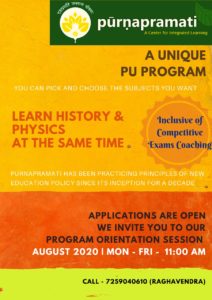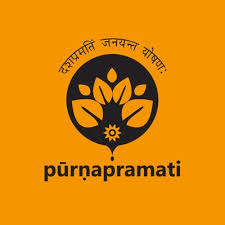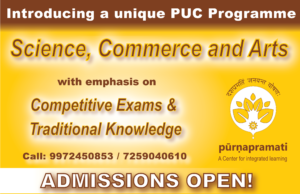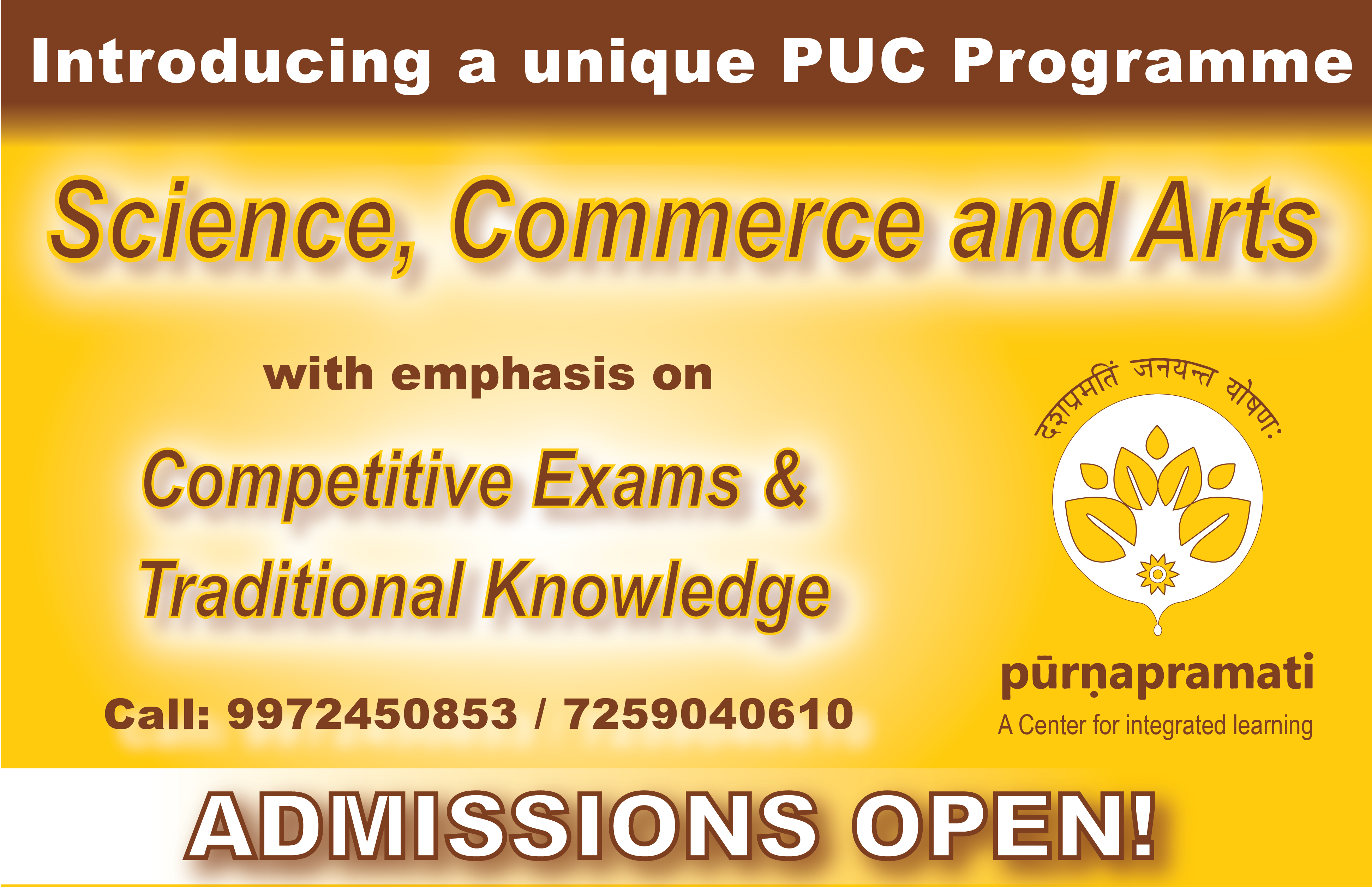Recent Updates
Subscribe
Programs
Higher Education
There is a palpable gap in the field of higher education for students in home-schooling, gurukulams and alternative non-convential educationals institutions. After spending considerable time in these alternatie avenues, students often find it unavoidable to transition to conventinal higher education to bridge their careers and aspirations with their academic pursuits.
These concerns have prompted us to initiate our venture into the realm o higher education. There is an urgent need to redefine research areas across all fields, guiding students and researchers towards areas that can effectively address societal challenges and help secure livelihoods for students.
Higher_Education_Preview
Events
PURNAPRAMATI EVENTS: (YEARLY) The events at Purnapramati are unique epitomes indicating the blend of ancient culture and contemporary needs. The students are given an exposure to the philosophical background of culturally significant days by operationalizing the celebrations to contemporary needs. 1) Bhaageerathi Jayanti (Environment Day) 2) Gurupurnima (Teachers’ Day) 3) Hayagreeva Jayanti (Knowledge Day ) 4) Vamana Jayanti (Children’s Day) 5) Dhanvantari Jayanti (Public Health Day) 6) Vanapuja (Forest Day ) 7) Gita Jayanti (Spiritual Day) 8) Sita Jayanti (Mothers’ Day) PURNAPRAMATI UTSAVA (ANNUAL FESTIVAL) Purnapramati celebrates a week longannual festival in the middle of second term. In this event, called “Purnapramati Utsava” the kids at Purnapramati are given an opportunity to showcase their talent in varied fields like Mathematics, Humanities, Arts and Sports. On each day, celebrations will be on a specified field. Dignitaries and experts from respective fields will be invited on every day to interact with the kids. A grand public event, called Purnapramati Mahotsava, will be held on the concluding day. PURNAPRAMATI VYAKHYA (SEMINARS ON EDUCATION) पूरà¥à¤£à¤ªà¥à¤°à¤®à¤¤à¤¿à¤°à¤¨à¥à¤¦à¤¿à¤¨à¤‚वà¥à¤¯à¤¾à¤–à¥à¤¯à¤¯à¤¾à¤½à¤½à¤ªà¥à¤¯à¤¾à¤¯à¤¯à¥‡à¤¨à¥à¤®à¤¾à¤®à¥ Pursuing its special characteristic of “action research” Purnapramati is active in educational research, especially in the field of integrated education. This is a platform which feeds theory to practice, and practice to theory. It grooms the teachers as practicing researchers. In lieu of this, the School conducts regular research seminars in the field of education under the banner “Purnapramati Vyakhya”. It also acts as a knowledge exchange program for researchers in education elsewhere. PURNAPRAMATI SAMMAN शà¥à¤°à¥€à¤®à¤¤à¥à¤ªà¥‚रà¥à¤£à¤ªà¥à¤°à¤®à¤¤à¤¿à¤—à¥à¤°à¥à¤•à¤¾à¤°à¥à¤£à¥à¤¯à¤¸à¤°à¤£à¤¿à¤‚पà¥à¤°à¤ªà¤¨à¥à¤¨à¤¾à¤ƒà¤®à¤¾à¤¨à¥à¤¯à¤¾à¤¸à¥à¤®à¤ƒ As a part of Purnapramati Utsava, the School honors a special individual every year through “Purnapramati Samman”. Purnapramati identifies and honors a person who has done significant work in integrating ancient and modern systems. It is believed that such great individuals would become role models for Purnapramtians. This is an exercise to show our respect to great souls, and is obviously not an award to them. The first samman was honored on Sri Rajendra Singh, Waterman of India from Rajasthan, Winner of Magsaysay Award, in respect of his efforts to preserve our rivers through traditional methods of water conservation. His efforts demonstrate that a holistic approach, which integrates traditional and modern systems, is better suited to address contemporary challenges. PURNAPRAMATI SAMEEKSHA इह सतà¥à¤¯à¤µà¤¤à¥€à¤¸à¥à¤¤à¤‚ हरिं परिपूरà¥à¤£à¤ªà¥à¤°à¤®à¤¤à¤¿à¤ƒ समैकà¥à¤·à¤¤ Purnapramati Sameeksha is an annual event conducted at Purnapramati, where a comprehensive assessment of child development is carried out by Sameeksha Team. The team will include mentors and experts in education, invited from both traditional and modern circles. Each member of the team called `Prashnika’, will interact with each child to provide a detailed report/feedback to the school. Prashnika focuses primarily on: – Alignment with the vision of Purnapramati. – Academic excellence – Philosophical insight in each subject – Integrated/Holistic progress of the child – Identification of Svadharma (Innate Specialty of each child)
Special Features
PURNAPRAMATI VANDARU-VRUNDA (VISITING FACULTY PROGRAM): वनà¥à¤¦à¥‡ तं तà¥à¤µà¤¾ सà¥à¤ªà¥‚रà¥à¤£à¤ªà¥à¤°à¤®à¤¤à¤¿à¤®à¤¨à¥à¤¦à¤¿à¤¨à¤¾à¤¸à¥‡à¤µà¤¿à¤¤à¤‚ देववृनà¥à¤¦à¥ˆà¤°à¥à¤µà¤¨à¥à¤¦à¥‡ वनà¥à¤¦à¤¾à¤°à¥à¤®à¥ In addition to highly capable regular faculty at Purnapramati, the School is fortunate to avail the services of rare experts in several fields of education. Each individual in an elite group called Purnapramati Vandaru Vrunda, a group of Doctors, Mathematicians, Artists, Social Scientists, Entrepreneurs, Sanskrit Scholars, Educationists, and Expert Teachers, visit the school for a certain number of hours every week. These members of the visiting faculty fraternity provide the kids with their unique experiential wisdom and wide exposure to specialized fields. They complement the regular faculty, by providing new perspectives and teaching a specific portion of the regular curriculum. Purnapramati is proud to host this program, one of the rarest of its kind. PARENT GUEST PROGRAM Purnapramati believes that the real goal of child centric development can be achieved only through a collective participation of all the stakeholders. The participation of the parents in all activities of the school is highly encouraged. It includes volunteering of organizing Purnapramati events, taking part in Vandaru Vrunda etc. In addition to such occasional events, a new idea – Guest Parent – is conceived to ensure a consistent engagement with parental community. As a part of this program, the school invites one parent each day to take part in the school assembly. This program is primarily an activity to include parents in Purnapramati ethos. It provides insights to parents on the live functionality at Purnapramati, which will never be captured in a report. It is also a platform for parents to express their thoughts to the School. PURNAPRAMATI SAMEEKSHA इह सतà¥à¤¯à¤µà¤¤à¥€à¤¸à¥à¤¤à¤‚ हरिं परिपूरà¥à¤£à¤ªà¥à¤°à¤®à¤¤à¤¿à¤ƒ समैकà¥à¤·à¤¤ Purnapramati Sameeksha is an annual event conducted at Purnapramati, where a comprehensive assessment of child development is carried out by Sameeksha Team. The team will include mentors and experts in education, invited from both traditional and modern circles. Each member of the team called `Prashnika’, will interact with each child to provide a detailed report/feedback to the school. Prashnika focuses primarily on: – Alignment with the vision of Purnapramati. – Academic excellence – Philosophical insight in each subject – Integrated/Holistic progress of the child – Identification of Svadharma (Innate Specialty of each child) SPECIAL ASSESSMENTS To gradually equip the kids for external competition, a controlled exposure will be given to competitions that are deemed age-appropriate and non-detrimental for psychological growth of young kids. A special test ASSET, a reputed national level test conducted by Educational Initiatives, to assess the acumen of conceptual understanding, irrespective of the curriculum followed, is also being introduced for kids of 3rd standard and above at Purnapramati. FIELD TRIPS: We believe that classroom learning is augmented by learning outside the classroom through fieldtrips based on different topics and interactions with professionals thus linking the curriculum with the real world. COMMUNITY SERVICE PROGRAM: Purnapramati celebrates national holidays through Community Service Programs. This program helps students to not only understand their community but also contribute to its sustainable development. The emphasis will be on clean environs. The students will take active role in inculcating environmental awareness among citizens. During the process, various values such as social consciousness, empathy, interdependence, leadership qualities etc. are instilled in the students.
Admission
Students in the age group of 2.5 to 3.5 years are eligible for admission to entry level Montessori. Montessori sessions start twice a year, once during June and another during November. Application forms are given during September and November respectively. Interested parents can contact info@purnapramati.in or call us at 080-26720077/080-26743040 n
Anandakanda
ANANDAKANDA(MONTESSORI) CURRICULUM Pre-primary education is a three year program. Purnapramati uses Montessori method at this stage. In addition to modern training students of Purnapramati will be exposed to Indian culture and heritage, trained for conversation in Sanskrit and memorization of Sanskrit rhymes.
One to Twelve
CURRICULUM The school will have an integrated curriculum comprising of both classical and modern systems. For modern subjects like English, Science, Mathematics, Social Sciences, the school will refer to National/International Curriculum Frameworks and identify suitable textbooks/worksheets to ensure quality on par with any national school. For classical subjects, the school will use curriculum adopted by Karnataka Secondary Education Examination Board, Purnaprajna Vidyapitha and such Sanskrit Institutes as a reference and come up with its own new curriculum to meet its objectives. Besides, for arts education curriculum from KSEEB and such art institutions will be referred. A due emphasis to fields like health, psychology, agriculture, environment, journalism and current affairs will be given. As a general guideline, academic council will conduct research continuously to give the best integrated curriculum. The school will also pay special emphasis to games and other extracurricular activities to ensure overall development of the child. Our regular weekly schedule will have appropriate slots for the same. In addition, it will have excursion program every winter and summer to expose the child to environment and society. This would be done through some lively programs like hiking and social initiatives. The school will use the best available mechanism to ensure its autonomous curriculum and pedagogy. To achieve this we train students in open school method. The students will attend the examination conducted by KSEEB, National Institute of Open Schooling (NIOS), Indian Certificate of Secondary Education (ICSE) or Cambridge International General Certificate of Secondary Education (IGCSE) boards for 10th grade. We also plan to offer grade 12 certification. LEARNING PROCESS AND PEDAGOGY Purnapramati believes that each child is unique and destined to realize his/her own self. The school is just an enabler for each child in its evolution. In addition, every child undergoes a gradual shift with age and learning. Considering these two parameters, the program is designed to subjectively address each child’s need and help it evolve stage by stage. It is designed for a stage-wise growth from play-way method to experiential and joyful learning, curious and conceptual learning and finally abstract and analytical learning. The nature of learning evolves to include creativity, discipline and motivation within a free, fearless and joyful environment. The pedagogy will mainly focus on ontological approach which relates reality with principles to make learning meaningful and relevant. The evaluation is mainly based on a continuous monitoring for individual growth. Elementary school will not have annual examinations. However, the students of middle and high school will be gradually trained to write annual competitive examinations to face the board exams. MEDIUM OF INSTRUCTION Purnapramati will adopt a unique multilingual approach for teaching. The school uses English as professional and technical language, Sanskrit as philosophical and cultural language, and Kannada as colloquial language. The students will be trained for proficiency in English, Sanskrit and Kannada. Students will be also be encouraged to use Hindi for inter-cultural communication. PHILOSOPHY OF ACADEMIC EXECUTION Purnapramati, grounded on its intention to be a center for integrated learning, has its primary focus on creating an environment that enables integration and learning. Most of the academic policies and details of implementation are visualized in this lieu. We have a very high teacher to student ratio to allow for effective interaction and development of each child. The teaching is considered as one of the modes of learning and not the only mode. Therefore classroom teaching is supplemented with numerous activities that engage children actively. Academic homework is kept to the minimum to avoid an unnecessary pressure. However to guide the kids for an efficient utilization of their curiosity, a creative and supplementary homework will be given. Integration of knowledge streams and paradigms of thoughts for a holistic growth and comprehensive development is ensured at every step. We make efforts to avoid isolated growth in just one subject or one skill without a global and integrated perspective in theory and practice. Therefore the academic framework includes integrated methodology to teach, integrated content to deliver and integrated processes to review resulting in an integrated Purnapramatian. Similarly, the examination policy of Purnapramati is quite robust, purposive and non-conventional. Examinations cannot be and should not be discrete checkpoints to measure competitiveness, but tools to understand and act on continuous growth and development. To achieve this purpose, it is necessary to avoid and gradually allay fear for examinations; but, couple this concept with the vision of review, comprehensiveness and love. Therefore, Purnapramati conducts continuous and surprise ‘avalokana’ with multiple components like worksheets, oral presentations, activities, and performances to understand the growth and development in heart, head and hand. Avalokanas will be followed up with the kids through enabling and corrective steps, whichever necessary, and with the parents by sharing the progress report once in a quarter. The progress of the child will be reported in qualitative terms and hence in rigorous detail.
Outreach
Vision of Pūrṇapramati is to provide integrated learning to all sections of society. This may not be possible within the scope of regular learning. To enable students from other schools, parents and any other interested people, we would like to offer variety of out-reach programs. CAMPS Summer and Winter camps are conducted to give complete perspective of learning and life. WORKSHOPS Workshops are conducted to give an overview of a particular discipline. COURSES Courses are meant for serious students who would like to undergo systematic study of a particular discipline through a formal process.














